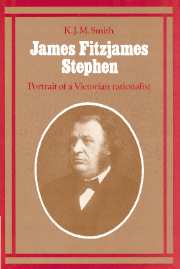Book contents
- Frontmatter
- Contents
- Preface
- 1 EARLY IMPRESSIONS: SIR JAMES, ETON AND CAMBRIDGE
- 2 A CONTROVERSIALIST IN THE MAKING: LITERARY CRITICISM AND LEADER-WRITING
- 3 A SCIENCE OF CRIMINAL LAW
- 4 ‘LAW LIVING AND ARMED’ – THE MECHANISM OF ENFORCEMENT
- 5 THE THREAT OF ‘HOOFS AND HOBNAILS’
- 6 INDIA AND THE IMPERIAL ETHIC
- 7 LIBERTY, EQUALITY, FRATERNITY: REFUTATION AND APOLOGIA
- 8 RATIONALISM'S BURDEN
- 9 THE BENCH AND BEYOND
- Notes
- Bibliography
- Index
3 - A SCIENCE OF CRIMINAL LAW
Published online by Cambridge University Press: 30 September 2009
- Frontmatter
- Contents
- Preface
- 1 EARLY IMPRESSIONS: SIR JAMES, ETON AND CAMBRIDGE
- 2 A CONTROVERSIALIST IN THE MAKING: LITERARY CRITICISM AND LEADER-WRITING
- 3 A SCIENCE OF CRIMINAL LAW
- 4 ‘LAW LIVING AND ARMED’ – THE MECHANISM OF ENFORCEMENT
- 5 THE THREAT OF ‘HOOFS AND HOBNAILS’
- 6 INDIA AND THE IMPERIAL ETHIC
- 7 LIBERTY, EQUALITY, FRATERNITY: REFUTATION AND APOLOGIA
- 8 RATIONALISM'S BURDEN
- 9 THE BENCH AND BEYOND
- Notes
- Bibliography
- Index
Summary
THE PRACTICAL EXPOSITOR
Stephen, in the course of a letter to his longstanding friend and confidante Lady Grant Duff, described himself as possessing ‘A good useful cut and come again intellect, which makes itself happy with quantities of cold meats and potatoes and table beer in the shape of law, and is greedily fond of pastry in the form of novels and the like’. Although here he distinctly understates his mental powers, there was some truth in this moment of half-serious insight, for Stephen's instinct was very much to keep his intellectual centre of gravity close to the ground. In him philosophical speculation tended to be guided by and inclined towards practical relevance, a turn of mind that not only found vent in journalism but also very much characterised his writing on general jurisprudential questions and his particular interest in the criminal law. The intellectual temperament with which Stephen approached legal theory was, in part, Benthamite, in the sense that he was ‘absolutely resolved that whatever paths he took should lead to realities, and traverse solid ground instead of following some will-o' -the-wisp through metaphysical quagmires’. Benthamism's fundamental attraction was its ‘reverence for facts’ – its belief that the source of knowledge was observation and the systematic appeal to experience. According to Leslie Stephen, his brother's Benthamism ‘was less a case of influence, however, than of “elective affinity” of intellect’.
- Type
- Chapter
- Information
- James Fitzjames StephenPortrait of a Victorian Rationalist, pp. 44 - 72Publisher: Cambridge University PressPrint publication year: 1988

